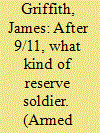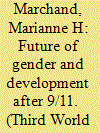| Srl | Item |
| 1 |
ID:
085359


|
|
|
|
|
| Publication |
2009.
|
| Summary/Abstract |
Two concepts, Moskos's institutional-occupational orientations and Meyer and Allen's organizational commitment, were used to develop several hypotheses concerning relationships of soldiers' stated reasons for joining and staying in reserve military service to their stated career intentions and to perceived unit readiness. Survey data were obtained from first-term, junior-ranking enlisted Army National Guard soldiers nationwide at three time periods. Time periods corresponded to different phases of the Iraq conflict- before, during, and after the initial invasion. The number of soldiers at each time period equaled about 7,000 to 8,500. Results suggest material incentives may increase recruitment and retention, yet at the same time, such incentives may not enhance readiness. Rather, incentives fostering normative and affective commitments, such as joining and staying for camaraderie and service to country, were related both to self-reported career intentions and perceived unit readiness.
|
|
|
|
|
|
|
|
|
|
|
|
|
|
|
|
| 2 |
ID:
089231


|
|
|
|
|
| Publication |
2009.
|
| Summary/Abstract |
The area of gender and development has been a site of critical contributions to the field of development studies and has been characterised as bridging practice, policy and theory. Since the policy of gender mainstreaming has been accepted, however, much of the originality and issues raised by the gender and development field have been marginalised and excluded from the development (policy) agenda. Some even argue that gender has been written out of the post- 9/11 development agenda thanks to the new global security regime. This article goes beyond these debates and suggests new ways of thinking about gender and development. Instead of arguing that it is 'dead', I argue that it is the site of innovative and critical thinking about development issues in a transformed and globalised world. The starting point for my argument is the insights provided by postcolonial feminism and transnationalism. While the former has contributed to feminist theorising through such concepts as representation, 'othering' and the silencing of Third World women's voices, the latter helps us understand new global realities resulting from migrations and the creation of transnational communities.
|
|
|
|
|
|
|
|
|
|
|
|
|
|
|
|
| 3 |
ID:
084311


|
|
|
|
|
| Publication |
2008.
|
| Summary/Abstract |
This article examines the justifications made for war by President Bush in Afghanistan and Iraq, cataloguing all the administration's statements that justify or support these wars. These discourses reveal a radical departure from the post-1990 trend of United States presidents, with international law and human rights being almost absent. The justifications point to a hegemonic US attempting to establish itself as the guarantor and provider of freedom and peace, attempting to establish a hierarchically structured international society.
|
|
|
|
|
|
|
|
|
|
|
|
|
|
|
|